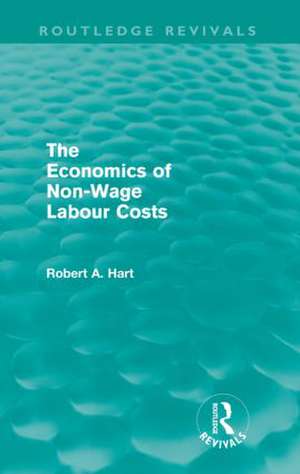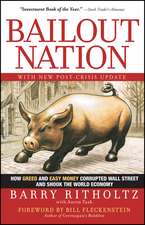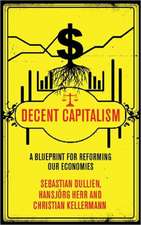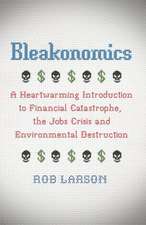The Economics of Non-Wage Labour Costs (Routledge Revivals): Routledge Revivals
Autor Bob Harten Limba Engleză Paperback – 14 mar 2011
The book focuses on two major areas of enquiry: firstly, the costs for the cyclical behaviour of employment, and secondly, the role of average working hours per employee in the firm’s overall allocation of labour services. The author begins with an empirical survey and costs breakdown, followed by extensive data on Japan, the UK, the USA and West Germany. The ensuing analysis considers the question as to why firms incur the various non-wages, and a comparative static factor demand model is constructed, which accommodates the major cost items.
Din seria Routledge Revivals
- 9%
 Preț: 801.71 lei
Preț: 801.71 lei - 8%
 Preț: 432.64 lei
Preț: 432.64 lei -
 Preț: 153.83 lei
Preț: 153.83 lei -
 Preț: 230.80 lei
Preț: 230.80 lei -
 Preț: 309.79 lei
Preț: 309.79 lei -
 Preț: 258.73 lei
Preț: 258.73 lei - 9%
 Preț: 764.35 lei
Preț: 764.35 lei - 9%
 Preț: 903.42 lei
Preț: 903.42 lei -
 Preț: 311.18 lei
Preț: 311.18 lei -
 Preț: 342.37 lei
Preț: 342.37 lei - 9%
 Preț: 606.36 lei
Preț: 606.36 lei -
 Preț: 317.54 lei
Preț: 317.54 lei - 9%
 Preț: 764.30 lei
Preț: 764.30 lei -
 Preț: 257.01 lei
Preț: 257.01 lei -
 Preț: 238.40 lei
Preț: 238.40 lei -
 Preț: 259.48 lei
Preț: 259.48 lei - 9%
 Preț: 903.81 lei
Preț: 903.81 lei -
 Preț: 326.26 lei
Preț: 326.26 lei -
 Preț: 258.67 lei
Preț: 258.67 lei -
 Preț: 294.98 lei
Preț: 294.98 lei -
 Preț: 308.89 lei
Preț: 308.89 lei -
 Preț: 199.86 lei
Preț: 199.86 lei -
 Preț: 347.50 lei
Preț: 347.50 lei -
 Preț: 302.59 lei
Preț: 302.59 lei -
 Preț: 389.40 lei
Preț: 389.40 lei -
 Preț: 257.01 lei
Preț: 257.01 lei -
 Preț: 343.22 lei
Preț: 343.22 lei - 9%
 Preț: 640.91 lei
Preț: 640.91 lei - 9%
 Preț: 619.49 lei
Preț: 619.49 lei -
 Preț: 228.88 lei
Preț: 228.88 lei -
 Preț: 257.68 lei
Preț: 257.68 lei -
 Preț: 245.11 lei
Preț: 245.11 lei -
 Preț: 258.54 lei
Preț: 258.54 lei -
 Preț: 258.73 lei
Preț: 258.73 lei -
 Preț: 368.93 lei
Preț: 368.93 lei -
 Preț: 246.38 lei
Preț: 246.38 lei - 9%
 Preț: 832.08 lei
Preț: 832.08 lei -
 Preț: 258.67 lei
Preț: 258.67 lei -
 Preț: 286.99 lei
Preț: 286.99 lei - 18%
 Preț: 695.86 lei
Preț: 695.86 lei - 9%
 Preț: 934.96 lei
Preț: 934.96 lei - 5%
 Preț: 243.38 lei
Preț: 243.38 lei -
 Preț: 267.15 lei
Preț: 267.15 lei -
 Preț: 200.67 lei
Preț: 200.67 lei - 9%
 Preț: 638.62 lei
Preț: 638.62 lei -
 Preț: 259.69 lei
Preț: 259.69 lei - 9%
 Preț: 1038.47 lei
Preț: 1038.47 lei -
 Preț: 389.46 lei
Preț: 389.46 lei -
 Preț: 302.14 lei
Preț: 302.14 lei -
 Preț: 302.27 lei
Preț: 302.27 lei
Preț: 297.37 lei
Preț vechi: 340.47 lei
-13% Nou
Puncte Express: 446
Preț estimativ în valută:
56.90€ • 59.62$ • 47.04£
56.90€ • 59.62$ • 47.04£
Carte tipărită la comandă
Livrare economică 11-25 aprilie
Preluare comenzi: 021 569.72.76
Specificații
ISBN-13: 9780415590044
ISBN-10: 0415590043
Pagini: 190
Dimensiuni: 138 x 216 mm
Greutate: 0.35 kg
Ediția:1
Editura: Taylor & Francis
Colecția Routledge
Seria Routledge Revivals
Locul publicării:Oxford, United Kingdom
ISBN-10: 0415590043
Pagini: 190
Dimensiuni: 138 x 216 mm
Greutate: 0.35 kg
Ediția:1
Editura: Taylor & Francis
Colecția Routledge
Seria Routledge Revivals
Locul publicării:Oxford, United Kingdom
Cuprins
1. Introduction 2. The Structure of Non-wage Labour Costs: Definitions and Distinctions 3. The Quantitative Importance of Non-wage Labour Costs 4. Why do Firms incur such Costs? 5. Factor Substitution and Non-wage Labour Costs 6. Cyclical Employment Effects 7. Wage Inflation and Wage Rigidities 8. Unemployment Insurance, Other Obligatory Social Welfare Contributions and Unemployment 9. Worksharing and Non-wage Labour Costs 10. Fringe Benefit Payments 11. Should Governments Attempt to Reduce Non-wage Labour Costs?
Descriere
Throughout the OECD, 30% of the average firm’s total labour costs comprises items which are other than direct remuneration. This reissue, first published in 1984, focuses upon these non-wage labour costs, which include; fringe-benefit payments, obligatory social-welfare contributions, holiday entitlements and expenditures on recruitment and training, seeking to make amends for the woeful lack of consideration given to these important factors in previous wage literature.















